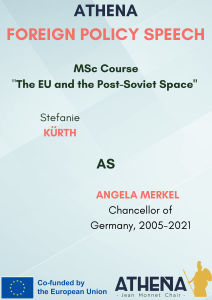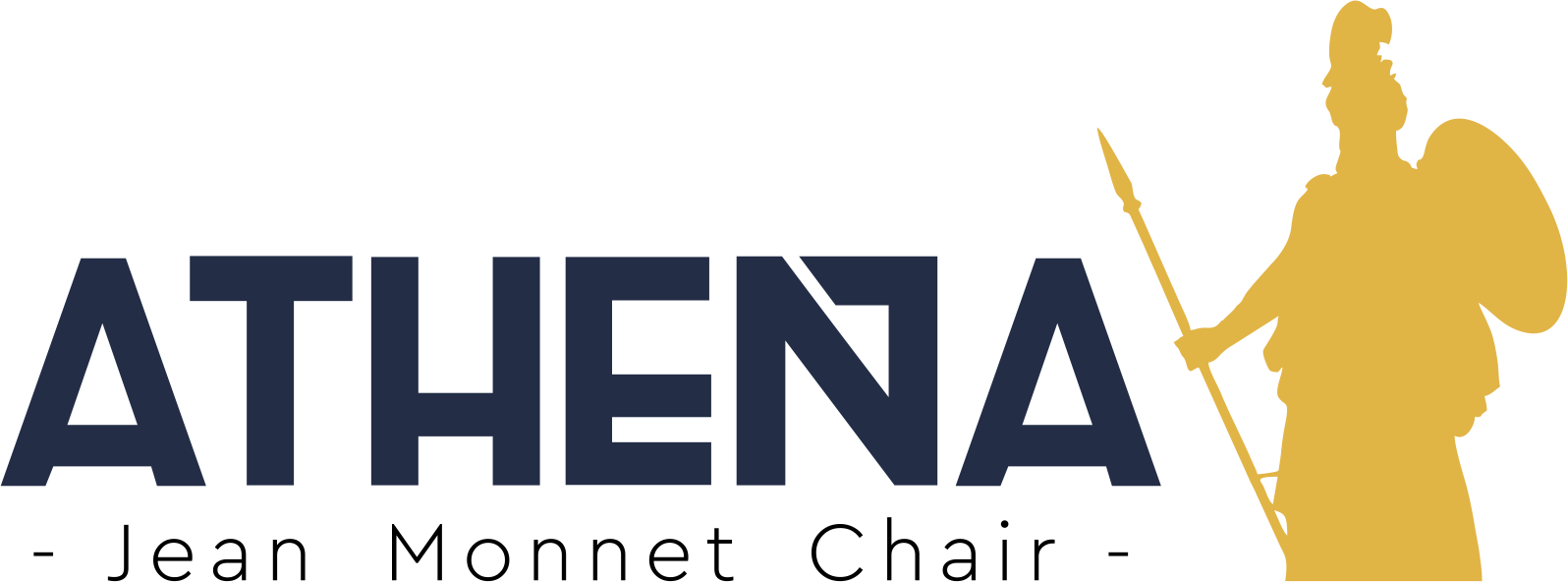
This “Foreign Policy Speech” by Stefanie Kürth can be accessed here.
It was originally written for the ATHENA Jean Monnet Chair MSc Course “The EU and the Post-Soviet Space” taught by Dr. Olga Burlyuk. It is published as part of our mission to showcase peer-leading papers written by students during their studies. This work can be used for background reading and research, but should not be cited as an expert source or used in place of scholarly articles/books.
Context
Policy Statement by Federal Chancellor Angela Merkel before the Eastern Partnership Summit of 2015 in Riga in front of the German Bundestag, 21.05.2015
In the frame of the current ongoing brutal aggression war by Russia in Ukraine, the inspiration for my foreign policy speech came from the careful deliberation, if the war in Ukraine as it happens today, could have been prevented (not in a Mearsheimerian way). And if so, when this point in time to change the course of history would have been.
After some research, I believe this moment to have been in 2015, a little over a year after Euromaidan and the subsequent annexation of Crimea, when demands from Ukraine were growing for a European perspective, analogously to the then on-hold project of North Stream 2, an expansion of the North Stream 1 natural gas pipeline system between Russia and Germany through the Baltic Sea. In 2015 then, the former German Federal Chancellor Angela Merkel held a policy statement in front of the German Bundestag on May 21st in preparation for her participation in the 4th Eastern Partnership (EaP) Summit, a joint initiative between the European Union and its Eastern European neighbors of Armenia, Azerbaijan, Belarus, Georgia, Moldova, and Ukraine, which intends to provide a forum for discussions regarding economic issues, but also shared values of democracy, prosperity, stability and joint ownership between the EU and its Eastern European partners. With the EaP Summit in 2015 being the first one to happen after the Crimea’s annexation, the expectations and the attention were high to see the outline of the next steps of EU-Ukraine bilateral relations, in particular with Germany as one of its leading forces and as Russia’s contract partner for the planned project of North Stream 2.
In her speech before the EaP summit in front of the Bundestag then, Merkel dampened prevalent expectations and declared that the EaP was “not an instrument of enlargement policy,” and that Georgia’s and Ukraine’s efforts in achieving the goals for EU candidacy status were not sufficient yet. Nonetheless, she posited the G8-summit happening the same year to only consist of the G7, excluding Russia as a reaction to the start of the Russo-Ukrainian war. Following this, I believe, that under the same-year’s G7-summit banner “Think Ahead, Act Together,” Germany and the EU could have made bold statements before and at the EaP summit in demarcation to the breach of national sovereignty from Russian forces and should have declared:
a) European candidacy status for Ukraine, which could have led to EU membership by 2022, including the EU’s mutual defense clause, which provides all EU member states with a military assistance obligation in case of armed aggression on its territory – thus, having the power of a deterrence policy, which could have led to Russian forces not fully invading Ukraine in 2022.
b) an end of North Stream 2 in order to avoid possible dependencies in the future by seeing and calling it by what it really is: a geopolitical project by Russia.
My foreign policy speech by Merkel, thus, takes place in the same time and circumstances as it did, but imagines it to portray a different message, heavily influenced by imagery used by e.g. Josep Borell, the European Union’s High Representative for Foreign Affairs and Security Policy, with his EU garden metaphor and other speeches by Merkel drawing on her Eastern German heritage and upbringing.


